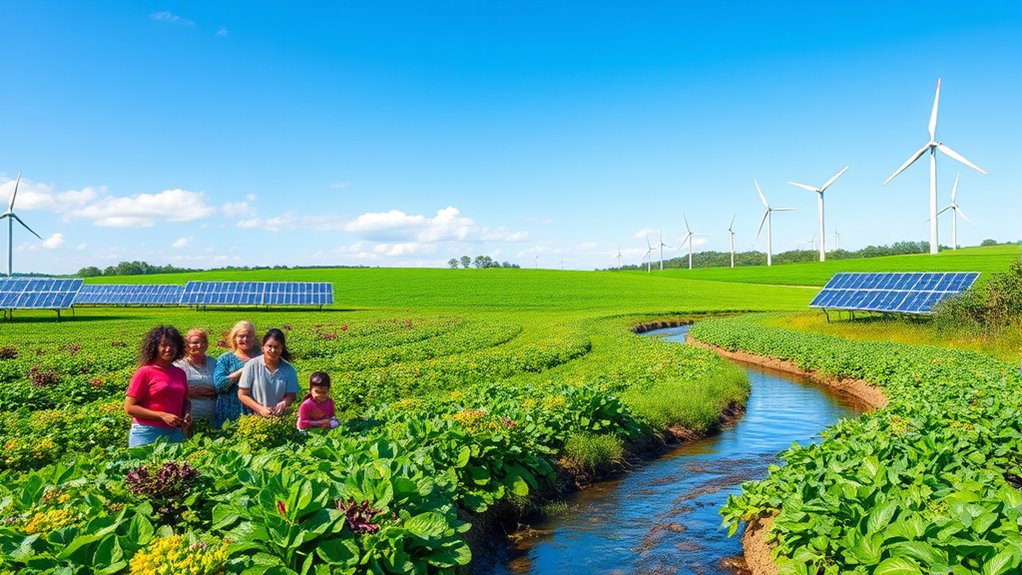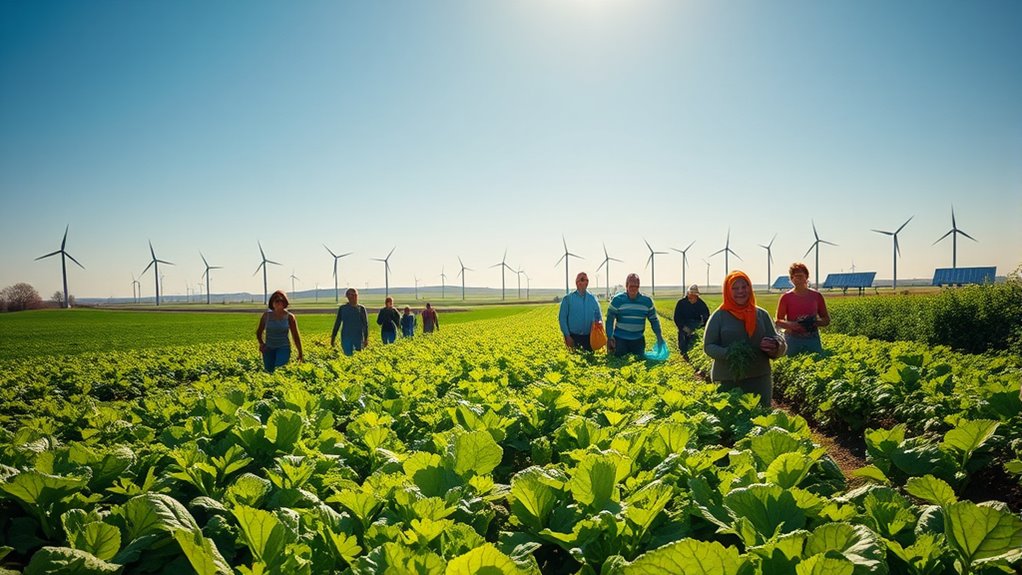Choosing a vegan diet can greatly lower your carbon footprint by reducing greenhouse gas emissions and conserving water. It lessens the need for resource-intensive farming and helps protect ecosystems and biodiversity. Your food choices can also slow deforestation and land degradation, supporting climate resilience. As demand for plant-based foods grows, it encourages sustainable innovations and policies. Discover how your diet can be a powerful tool against climate change and what more you can do.
Key Takeaways
- Adopting a vegan diet reduces greenhouse gas emissions from animal agriculture, helping combat climate change.
- Vegan diets require less land and water, decreasing resource depletion and deforestation.
- Reduced demand for animal products lowers methane emissions, a potent greenhouse gas.
- Supporting plant-based foods promotes sustainable farming practices that preserve ecosystems.
- Widespread veganism can influence policies and market trends toward more eco-friendly food options.

Climate change is one of the most urgent challenges we face today, and your choices can make a significant difference. One impactful way to contribute is by adopting a plant-based diet, which directly influences how we produce food and its environmental footprint. The shift towards sustainable agriculture, especially through plant-based innovations, offers promising solutions to reduce greenhouse gas emissions, conserve water, and protect ecosystems. When you choose plant-based foods, you’re supporting agricultural practices that are less resource-intensive and more resilient to climate impacts. This approach minimizes the need for large-scale animal farming, which is a major contributor to methane emissions and land degradation.
Adopting a plant-based diet reduces environmental impact and promotes sustainable, climate-resilient agriculture.
By embracing plant-based innovations, you’re encouraging a food system that prioritizes renewable resources and eco-friendly techniques. These innovations include lab-grown meats, plant-based meats, and advanced crop cultivation methods that use fewer chemicals and water. Such developments are transforming the way we think about food production, making it more sustainable and accessible. When you opt for plant-based options, you’re also helping to reduce deforestation, as less land is needed to grow crops compared to raising animals. This not only preserves biodiversity but also prevents the release of stored carbon from forests into the atmosphere.
Your dietary choices can influence agricultural policies and market trends. As demand for sustainable, plant-based foods rises, farmers and companies are more likely to invest in sustainable agriculture practices. This creates a positive feedback loop—your support for plant-based innovations encourages innovation itself. Additionally, reducing reliance on animal agriculture can help stabilize local climates, as livestock farming is a significant source of methane, a potent greenhouse gas. Lowering methane emissions can make a notable difference in slowing climate change.
Moreover, choosing plant-based diets contributes to reducing water consumption, since producing plant-based foods generally requires less water than animal products. This is vital in regions facing water shortages intensified by climate change. Your food choices can also inspire others to follow suit, creating a ripple effect that amplifies your positive impact on the planet. By supporting sustainable agriculture and plant-based innovations, you’re actively participating in a global movement toward a more resilient and eco-friendly food system.
Frequently Asked Questions
How Quickly Can Individual Vegan Diets Reduce Carbon Footprints?
You can see a noticeable reduction in your carbon footprint within a few weeks of adopting a vegan diet. The diet shift pace varies based on your previous eating habits, but consistently choosing plant-based foods quickly lowers emissions. By making mindful, steady changes, you accelerate your carbon footprint reduction, contributing meaningfully to climate change mitigation. Every plant-based meal helps, and the impact grows as you maintain your new diet.
What Are the Economic Impacts of Widespread Vegan Adoption?
Imagine a tide of change reshaping the economic landscape—you’re part of this wave. Widespread vegan adoption boosts economic resilience by reducing reliance on traditional agriculture and livestock industries. It sparks market adaptation, creating new opportunities in plant-based foods and sustainable products. While some sectors face challenges, overall, this shift encourages innovation, diversifies markets, and paves the way for a more sustainable, resilient economy that benefits both people and the planet.
How Does Veganism Affect Water Conservation Efforts?
You can substantially boost water conservation by adopting veganism, as plant-based diets require less water than meat-based ones. This leads to considerable water savings across your lifestyle. Supporting conservation strategies, such as reducing water waste and choosing sustainably farmed foods, amplifies this impact. Your dietary choices directly contribute to more sustainable water use, helping protect essential resources for communities and ecosystems alike.
Are Plant-Based Alternatives Environmentally Sustainable?
Imagine lush fields where vibrant crops flourish, supporting sustainable farming and preserving biodiversity. Plant-based alternatives are generally more environmentally sustainable than traditional animal products because they require less land, water, and energy. By choosing these options, you help protect ecosystems, reduce greenhouse gases, and promote biodiversity preservation. Your diet becomes a powerful tool for fostering a healthier planet, ensuring future generations can enjoy thriving, diverse landscapes.
Can Veganism Help Mitigate Specific Climate Change Tipping Points?
Yes, veganism can help mitigate climate change tipping points by reducing greenhouse gas emissions and preserving biodiversity. By adopting a plant-based diet, you lower demand for land-intensive animal agriculture, which helps protect soil carbon and supports biodiversity preservation. This decrease in emissions and habitat loss can slow or prevent reaching critical climate thresholds, making veganism a powerful personal choice to contribute positively toward stabilizing the planet’s climate system.
Conclusion
You might wonder if switching to a vegan diet really makes a difference for the planet. The truth is, it does—studies show plant-based diets reduce greenhouse gas emissions profoundly. While one person’s choice alone can’t solve climate change, every small step counts. By choosing vegan, you’re not just improving your health but also helping protect the Earth for future generations. So, why not give it a try? Your planet will thank you.









